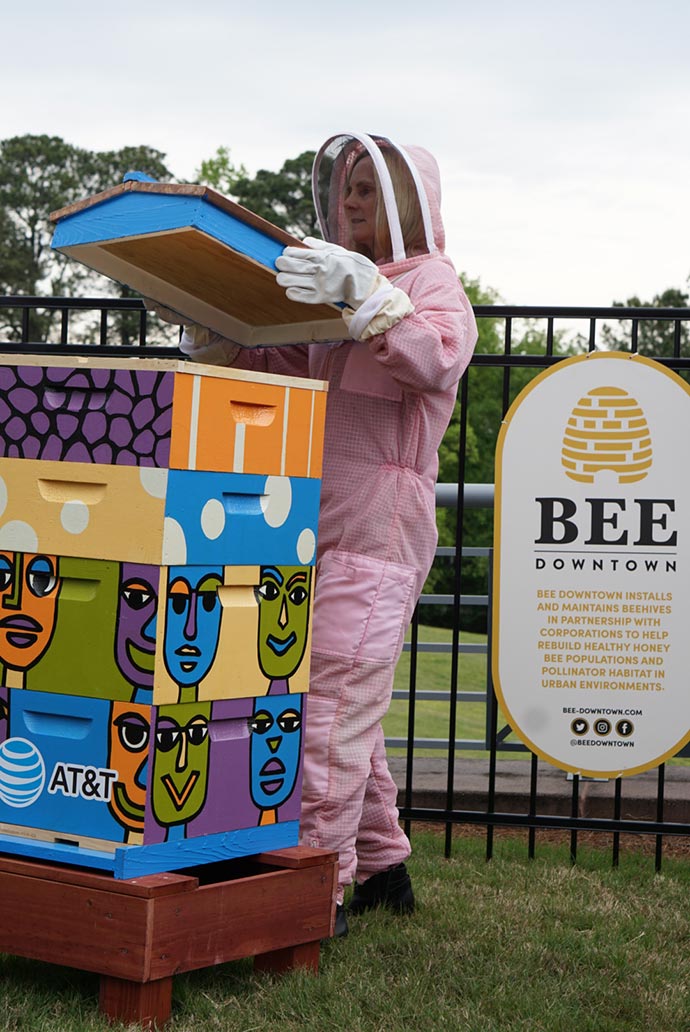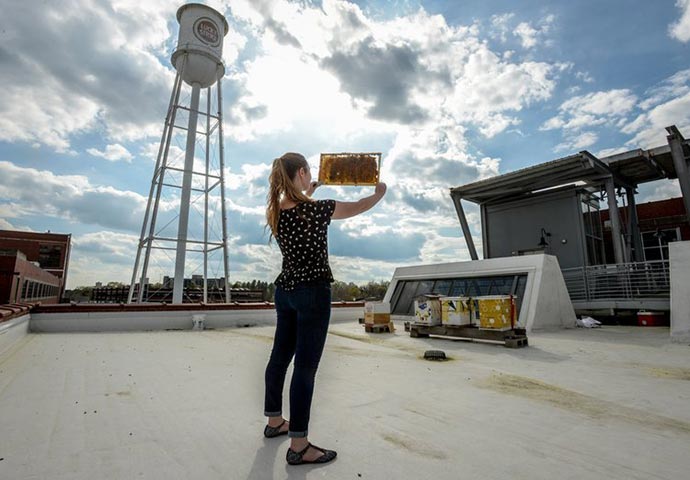Leigh-Kathryn Bonner believes a healthy business functions a lot like a healthy beehive.
"A hive is one of the most efficient structures found in nature," says Bonner, founder and CEO of the quirky startup Bee Downtown. Bonner, 25, has parlayed a quixotic vision into a buzzworthy enterprise that’s finding partners among a swarm of the Fortune 500.
Based at startup incubator American Underground in Durham, North Carolina, Bee Downtown posted 2017 revenues of $350,000 and expects to hit $1 million this year. For an annual subscription fee, companies pay Bee Downtown to install and maintain honeybee hives on their urban campuses and to conduct related seminars in beekeeping, sustainability and leadership.
Delta Airlines and AT&T took on beehives at their respective Atlanta campuses in April, signaling Bee Downtown’s move into its second major market since its founding in 2014.
"We feel that sustainability is one of our corporate responsibilities, so this is a great opportunity for us," said Mel Coker, senior vice president and chief strategy officer for AT&T Communications, adding that the company’s three hives will be a boon for employee engagement.
"Beehives," Bonner told AT&T managers and executives at an unveiling ceremony, "are a metaphor for how we work as a community. If we work together, we can make a much bigger difference at a much faster pace."
Unlikely Beginnings
The unlikely business venture began partly by accident. Bonner, a fourth-generation beekeeper, wanted to keep a hive at her college apartment complex in Raleigh. Buzz off, said management.

Not one to blanch in the face of a challenge, the peripatetic Bonner prevailed upon the company she was interning with to host a hive on its roof. Burt’s Bees, a well placed and well named neighbor, took notice.
"Burt’s said, ‘We’d love to have some bees, too.’ It kind of snowballed and turned into something," Bonner says. "We found people really enjoyed the bees."
Having nixed a promising job offer to pursue her unfolding dream, Bonner took out a $15,000 loan from her parents, who gave her a year to make it work. Work, it did. IBM signed on with Bee Downtown, as did SAS, Blue Cross Blue Shield, and North Carolina State University. In its first three years, Bee Downtown accumulated 40 partners in the Raleigh-Durham region, and Bonner was the bee’s knees of the startup scene, garnering plaudits from the likes of Inc. Magazine, which recently named her to its "30 Most Inspiring Entrepreneurs Under 30."
A Helping Hand
Among others taking note was Engage Venture Fund, which accepted Bee Downtown into its first cohort of eight South-based startups last fall. Based in Atlanta and established by powers such as AT&T, Delta, Goldman Sachs, Georgia Power, Chick-fil-A and Intercontinental Exchange, Engage’s mission is to strengthen collaboration and partnerships between leading corporations and top entrepreneurs.
"We’re working with these major corporations on flexing that innovation muscle," says Thiago Olson, managing director of Engage Ventures. "We’re working with the senior-most leadership in the companies to change the way they work with early-stage companies. Having these major brands associated with them can really take startups to the next level.
"We look for startups," says Olson, "that we feel we can help with distribution, access and scale. Bee Downtown is hitting on a resonant point, as we saw in North Carolina, and this was an opportunity to connect Leigh-Kathryn with major brands here in Atlanta."
Bee Friendly
Bonner likes to remind audiences that one of every three bites of food is directly or indirectly pollinated by honeybees. She also points out, alarmingly, that one-third of the country’s honeybee colonies were lost in the past year, a claim supported by an annual survey conducted by the Bee Informed Partnership and the Apiary Inspectors of America. Parasites, poor nutrition and pesticides are among a long list of culprits.

The health of the bee population was why the Slovenian Beekeepers’ Association launched an effort in 2014 to make May 20 World Bee Day. After the Slovenian government hopped on board, the United Nations recognized the proposal in December 2017, and the first-ever World Bee Day occurred earlier this week.
Introducing hives into downtown areas, says Bonner, is good for both the bees and the local ecosystem.
"Honeybees thrive in urban environments," she says. "There’s so much diversity of food sources, and they’re much more likely to survive winter."
One honeybee, says Bonner, can pollinate about 1,200 flowers a day.
"They’re making the flowers bloom. They’re making the trees stronger. They’re making the soil healthy. Bees," she says, "fly three miles in all directions. That’s 18,000 acres the hives will positively impact."
The effect, she says, is magnified with each new hive she installs, in a sense mimicking the interactive workplace ecosystems that all businesses seem to want.
"Those three-mile circles begin to overlap, and what you end up having," she says, "is this wonderful corridor of pollinator-friendly plantings on campuses, of healthy beehives and of employees that are getting to learn."

